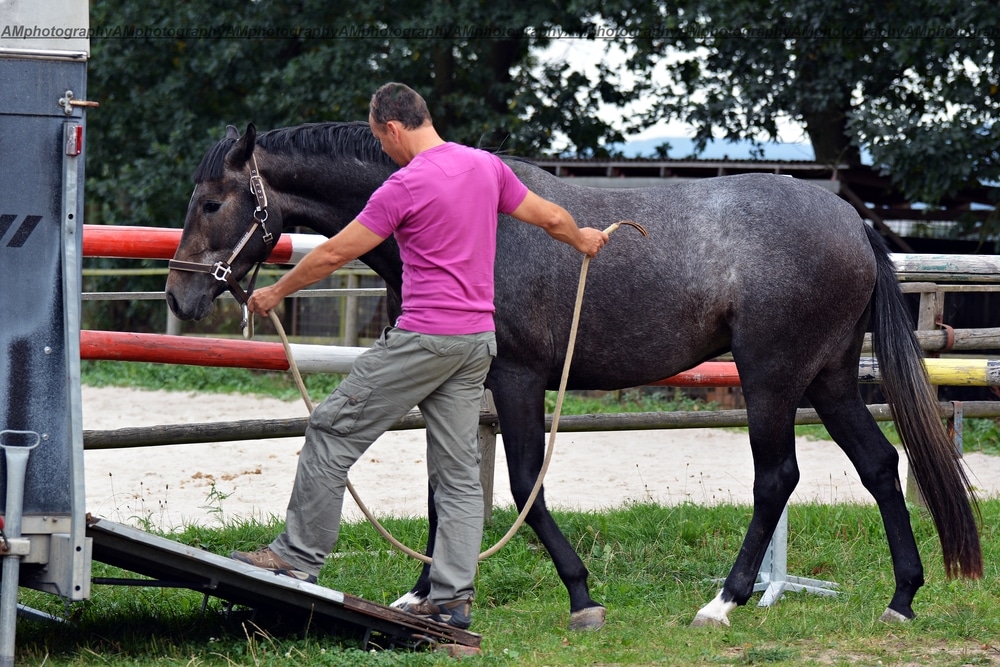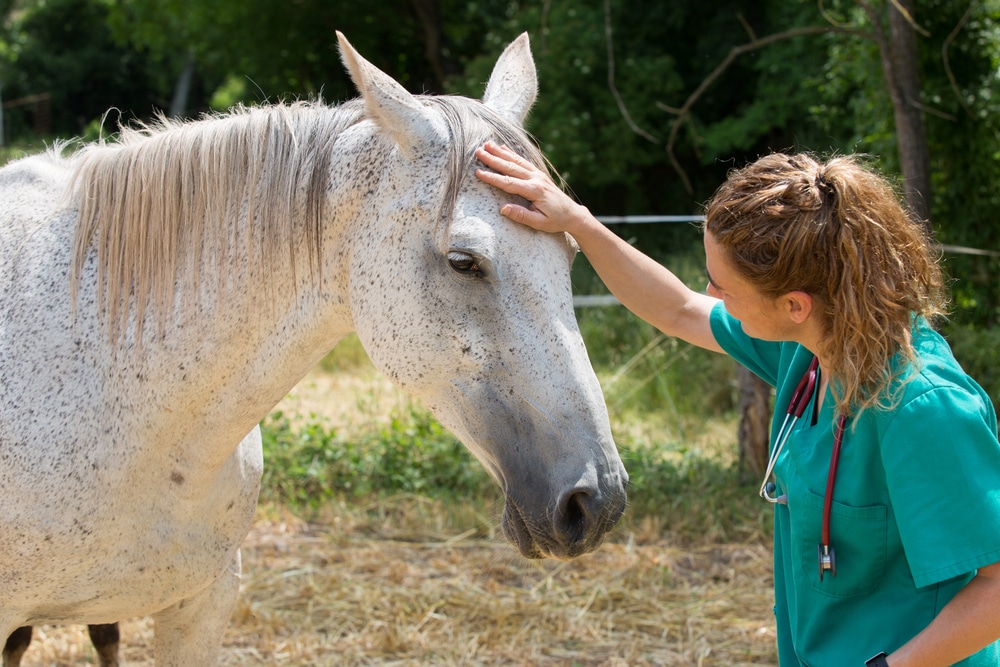Vaccines, Coggins tests, and health certificates are a few protocols we follow to help keep your horse healthy. Our Bear Creek Large Animal Clinic team understands how much your horse means to you, and we provide information about these wellness care services and tips on how you can protect your horse from equine herpes myeloencephalopathy (EHM).
Equine vaccines
Vaccines are classified as core or risk-based. The American Veterinary Medical Association (AVMA) defines core vaccines as those which provide protection from diseases that are endemic to a region, present a potential threat to public health, virulent (i.e., highly infectious), or pose a severe disease risk. In addition, some core vaccines are required by law. Risk-based vaccines are those which your veterinarian recommends based on your horse’s lifestyle, disease risk, and reproduction status. The American Association of Equine Practitioners (AAEP) identifies the following vaccines as core or risk-based:
- Core vaccines:
- Eastern and Western equine encephalitis (EEE and WEE)
- Rabies
- Tetanus
- West Nile virus (WNV)
- Risk-based vaccines:
- Anthrax
- Botulism
- Equine Herpesvirus 1 and 4 (EHV-1 and EHV-4)
- Equine influenza
- Equine viral arteritis
- Leptospirosis
- Potomac horse fever (PHF)
- Rotavirus diarrhea
- Strangles
- Venezuelan equine encephalomyelitis (VEE)
Once vaccinated and boosted, most adult horses need to be vaccinated every 6 to 12 months, depending on the vaccine. Foal vaccines are typically started at about 4 to 6 months of age, and boosters are administered at 5 to 7 months and at 10 to 12 months of age. Broodmares should receive core vaccines four to six weeks prepartum. They should also receive a product labeled for EHV abortion prevention at five, seven, and nine months’ gestation. Our Bear Creek Large Animal Clinic team can determine the best vaccination protocol for your horse based on their particular circumstances.
A note about Equine Herpesvirus
Nine known EHVs have been identified worldwide. However, EHV-1, EHV-3, and EHV-4 pose the highest risk in the United States. EHV-1 and EHV-4 cause upper respiratory disease, abortions, neonatal death, and neurologic disease. These viruses are transmitted through nose-to-nose contact, contaminated equipment, and respiratory secretions. Aborted fetuses and afterbirth tissues can also contain the virus. EHV-3 causes venereal disease and is spread during mating or the use of contaminated breeding equipment. Current available vaccines help prevent EHV respiratory and abortion forms, but none are effective against EHM, which is the neurologic form. To help protect your horse from contracting this concerning disease, follow these tips:
- Limit horse-to-horse contact, especially when at equine facilities and events.
- Avoid communal water sources.
- Avoid equipment sharing unless you thoroughly clean and disinfect apparatus between uses.
- After interacting with a horse, wash or sanitize your hands before you interact with another horse.
- To help reduce signs and EHV-1 shedding, ensure your horse is up-to-date on their EHV vaccination.
- Limit your horse’s exposure to stressful situations.
- Monitor your horse for EHM signs, including fever, nasal discharge, cough, reddish mucous membranes, swollen limbs, ataxia, recumbency, and urinary incontinence.
Equine Coggins test
A Coggins test is a blood test that identifies antibodies for equine infectious anemia (EIA), a potentially fatal disease that currently has no treatment or vaccine. EIA is a viral disease that can affect all equids. Consider these EIA facts:
- Transmission — Biting flies, such as horse and deer flies, often transmit EIA. Other potential transmission modes include using contaminated equipment, such as used needles and syringes, mare-to-foal transmission in utero, and through natural breeding.
- Signs — Testing is essential because horses with EIA are usually asymptomatic carriers, serving as disease reservoirs. When signs are present, they include fever, weight loss, disorientation, and rapid death.
- Carriers — Because virus carriers pose a risk to horses in the vicinity, they must be euthanized or permanently quarantined at least 200 yards away from all other equids.
- Prevention — Annual testing helps reduce EIA transmission. You can also help reduce disease spread by using a new, sterile needle every time you inject your horse, employing fly management strategies, such as an integrated pest management system, quarantining new horses for at least 14 days after arrival to your farm, and only participating in equine events that require participants to have proof of a negative Coggins test.
Equine health certificates

A health certificate (i.e., Certificate of Veterinary Inspection [CVI]), is a document required for interstate travel. In addition, some equine facilities and events require all equids to have a health certificate. The document ensures a U.S. Department of Agriculture (USDA)-accredited veterinarian has recently evaluated your horse, and that, at the time of inspection, the equid appeared healthy and exhibited no illness signs. In the United States, horses crossing state lines must have a health certificate and a negative Coggins test. CVIs are necessary to help reduce disease spread from horse to horse and from one geographic area to another. CVIs typically expire after 30 days, but in some cases, extensions can be granted for up to six months. To obtain your horse’s CVI, you must provide the following information:
- Place of origin — Responsible party, address, phone number, and email address
- Destination — Contact name, address, phone number, and email address
- Veterinarian information — Name, clinic name, accreditation number, and address
- Horse’s information — Breed, sex, color, age, permanent identification such as microchip or tattoo
- EIA test information — Test result, test date, laboratory that ran the test, and lab identification number
- CVI information — Form number and issue date
- Transport information — Date and reason for transport
- Veterinary signature — Veterinary signature and date signed
If your horse needs vaccines, a Coggins test, or a health certificate, schedule an appointment with our Bear Creek Large Animal Clinic.








Leave A Comment